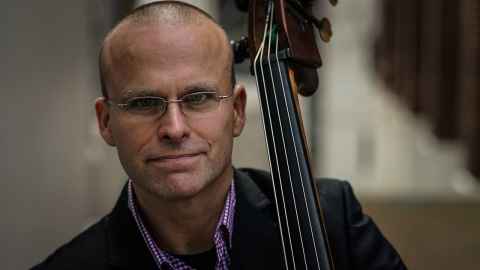Jazz teacher gathers ‘once-in-a-lifetime’ band
30 June 2021
Dr Olivier Holland, jazz department at the School of Music, gathered what he describes as “a once-in-a-lifetime-band” of some of the best musicians that currently walk this planet for his just-released double album Gjazz5.

The album Gjazz5 was three years in the making, and looking back over his 30-album discography, Dr Holland describes it as his “flagship” project.
The bass player, composer and teacher started his career as a bassist in 1989 and has performed at major festivals and venues with some of the finest jazz artists in New Zealand and Europe.
The group on the album Gjazz5 includes Geoffrey Keezer (USA) on keys, Terreon Gully (USA) on drums, Denis Gaebel (Germany), School of Music colleague Roger Manins on saxophone as well as renowned German guitarist Joscho Stephan.
The recording session took place in Germany in March/April 2018 at the Fattoria Musica studios. The pandemic didn't affect the project in a significant way, he says, “but of course, those of us who are also jazz lecturers were working under a higher workload than normal, which slowed things down at bit”.
Good things take time, in Gjazz5’s case, three years. “The aim was for this album to sound ‘bombastic’ in every way,” says Dr Holland. Once the mixing was done, and the ‘ironing out’ completed in 2018, he went looking for a mastering engineer who could add “that sparkle and depth to the sound that only a seasoned mastering engineer can”.
He approached Grammy Award-nominated mastering engineer Kelly Hibbert in Los Angeles. After a few revisions, the tracks sounded ‘killing’, and ready for release.
Dr Holland’s jazz compositions integrate funk, afro-style, Hip Hop, disco, salsa, ballads and more genres which are frequently fused with jazz.
Unusually, three of the compositions on Gjazz5 feature the talents of German ‘gypsy jazz’ guitarist Joscho Stephan. “Gypsy Jazz” is a small-group style of jazz originating from the Romani guitarist Jean ‘Django’ Reinhardt, in conjunction with the French swing violinist Stéphane Grappelli. The sound of gypsy jazz is typically acoustic and the improvisions within this genre tend to outline the harmony more than most contemporary jazz musicians would.
“In addition, the acoustic instruments, the ‘driving sound’ of the rhythm guitar and the agility required of the guitarists are attributes that make gypsy jazz sound somewhat ‘special’ or niche, and also more difficult to make a meaningful fusion with contemporary jazz,” says Dr Holland.
He was able to draw on a strong relationship with renowned gypsy jazz guitarist, Joscho Stephan, who for sound compatibility, played electric instead of acoustic guitar.
The physical double CDs of Gjazz are sold non-profit, and a proportion of the cost of every CD sold goes towards a project called “Save this Slice of Marine Paradise” by “Avaaz”, an organisation raising funds to save a strip of the Atlantic off the west coast of Africa and aims to turn it into a marine sanctuary. The area is home to some of the world’s most threatened marine species such as the humpback dolphin.
Olivier describes himself as a “bit of a water-rat”. When he is not playing, writing or teaching music, he follows other passions which include spearfishing and sailing – between 2000 and 2002, he sailed from Germany to New Zealand on his own yacht.
“As such I have some decent first-hand insights into the state of our waters. And it's not looking good.
“I feel very strongly that we all need to do something and hope that many more get on board with projects such as Avaaz’s and that, in the long term, a mind-change occurs.”
On a brighter note, he has detected the whiff of a positive sea-change in our appreciation of live music. Asked about the impact of Covid-19 on musicians in 2020 he said “it was nothing short of a disaster”. He also predicted – or at least hoped, some good would come out of it.
“And actually, it did! After the lockdown was lifted, the demand for live music rose exponentially, compared to the situation before Covid. Everyone seemed to be hungry to go out and be entertained.
“This is ongoing and it is good to see how many of our - current and former - jazz students play well-paid gigs around Auckland, some of them three or more times a week.”
Media contact
Margo White I Media adviser
DDI 09 923 5504
Mob 021 926 408
Email margo.white@auckland.ac.nz